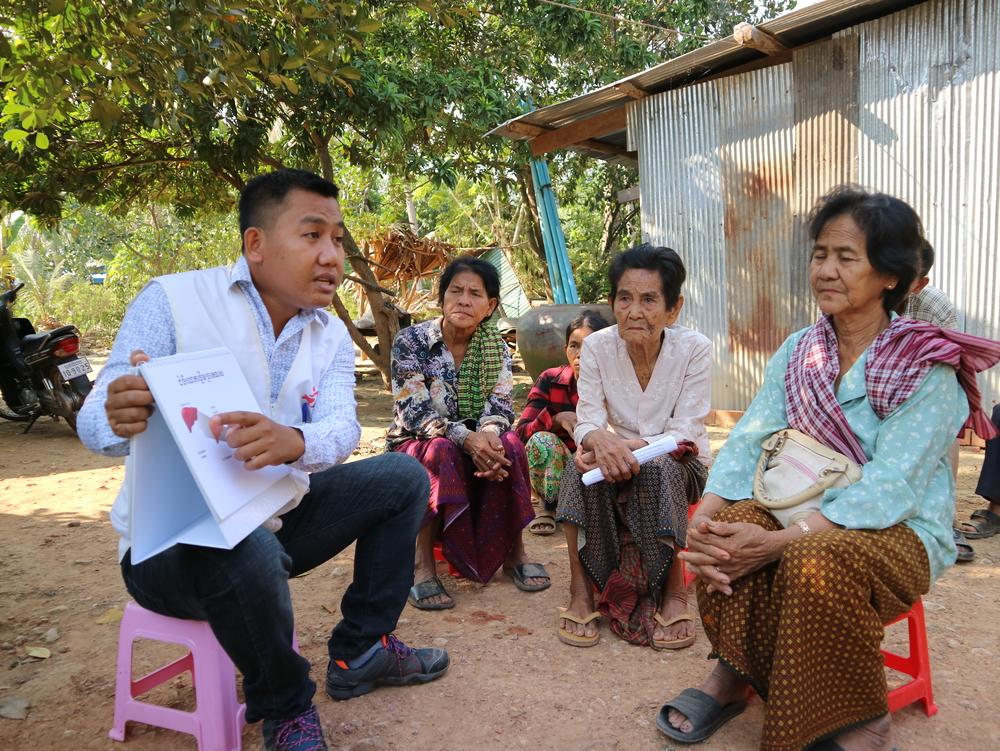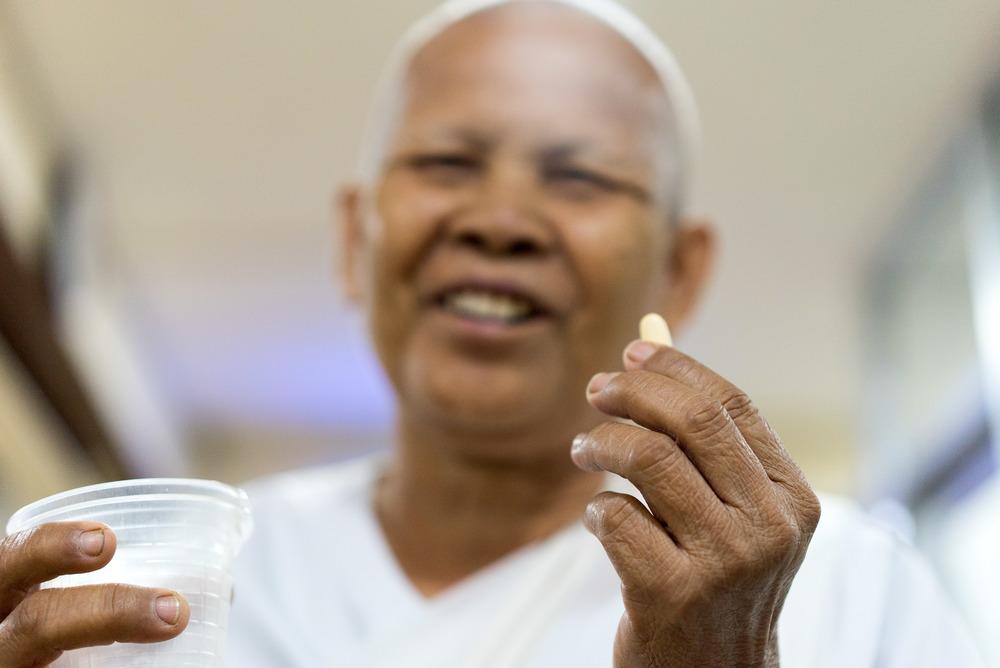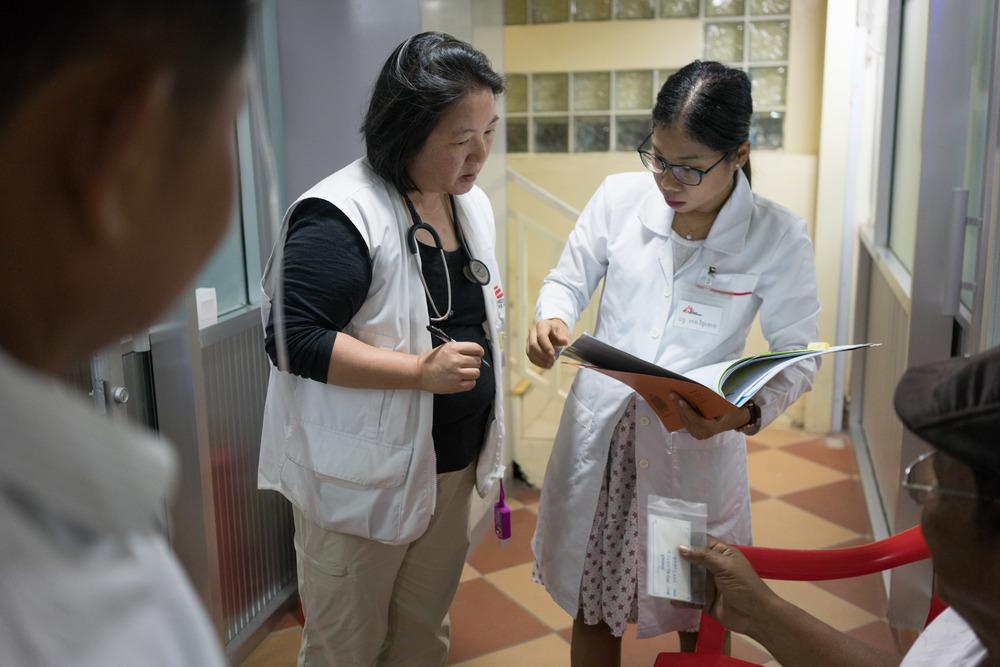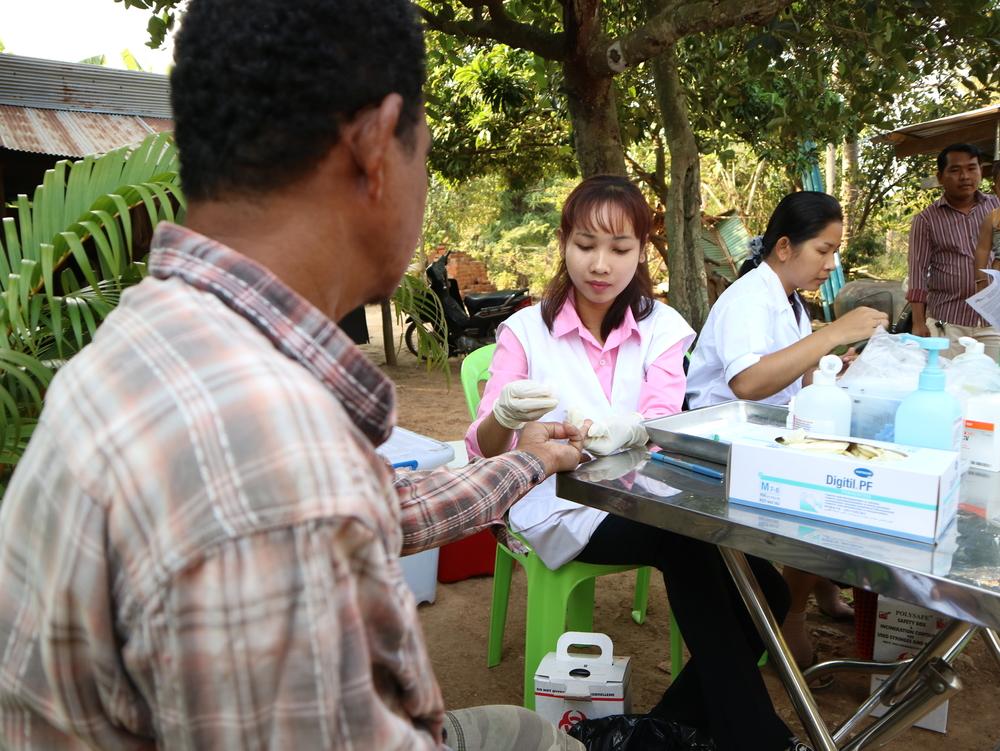Cambodia: Treating hep C, from an innovative project to fruitful avenues for other countries

Khen Sophea carries out information and education activities during an active Hepatitis C case finding campaign in a village in Moung Ruessei district in Cambodia. Cambodia, 2019. © Simon Ming/MSF
Between 2016 and 2021, Doctors Without Borders / Médecins Sans Frontières (MSF) teams developed a care programme for hepatitis C virus (HCV) patients in Cambodia, first in the capital Phnom Penh, before extending it to rural areas. More than 19,000 patients have been treated thanks to work to make new, much more effective drugs available, and to the development of a simplified and decentralised model of care for hepatitis C. Doctors Without Borders has handed over the programme to the Cambodian health authorities, and is now focusing on extending this simplified system of care, integrating it into the health system in other countries. We reflect on five years of struggling against this deadly disease.
Making new drugs accessible
Hepatitis C is responsible for the deaths of nearly 300,000 people each year, especially in low-and middle-income countries, where 75 per cent of people with the virus live. In 2014, new drugs called direct-acting antivirals (DAAs) came onto the market. They treat the disease in a shorter time compared to older treatments (12 weeks), orally, with few side effects and cure rates of around 95 per cent.
However, the first prices imposed by the pharmaceutical companies on DAAs sofosbuvir or daclatasvir were prohibitive, both for patients in wealthy countries, where treatments could reach up to US$147,000, and for those in low- and middle-income countries. Médecins Sans Frontières teams decided to launch a pilot project to screen and treat the disease in Cambodia, while working with other organisations to challenge the patents on the drugs, lower the prices of sofosbuvir, daclatasvir, and improve access to diagnostic tools.
We carried out the first hepatitis C screenings in May 2016, at the Preah Kossamak hospital in Phnom Penh. Although the seroprevalence of the disease in Cambodia is unknown, it is estimated that 2.6% of the country’s adult population is affected by HCV. The first patients tested are part of a cohort of people living with HIV, a group of people wrongly thought to be largely affected by the disease. Testing was opened up to the general population in October 2016.
“First indications were that people with HIV-HCV coinfection was by far the smallest part of the caseload,” said Mickael Le Paih, the former project’s Head of Mission.
Another unexpected result is that the age of HCV-positive patients is relatively old: over 90 per cent are over 40 years old. In January 2017, after a few months of activity, more than 3,200 people are waiting to be diagnosed and nearly 300 are already under treatment. Doctors Without Borders offers the only free care available in the country. The high price of drugs, though, does not make it possible to offer treatment to as many people as possible.
“Almost two decades ago, Doctors Without Borders and others worked hard to get access to generics and bring down prices for HIV medicines,” said Le Paih in 2017. “History is repeating itself with hepatitis C — the medicines we need are again too expensive, but we are finding ways to make treatment affordable so that our patients can be cured.”
With the support of Doctors Without Borders' Access Campaign, we are able to obtain generic treatment at a price of $120 per patient in 2018, up from around $1,600 previously.

A Patient holds their meds at the Doctors Without Borders Hepatitis C clinic at Preah Kossamak Hospital in Phnom Penh. Cambodia, 2017. © Todd Brown
Simplifying support
Faced with the very strong demand for access to these new treatments, throughout 2017 our teams prescribe drugs only to the patients with the most advanced disease, due to a lack of drugs. In 2018, we were able to extend treatment to all people with hepatitis C. Hundreds of Cambodians come to Preah Kossamak hospital in Phnom Penh every day, sometimes from remote areas.
“I tried traditional medicine first but this was not successful”, said Vanna Chou, a few weeks after he started DAA treatment. “After I saw on Facebook that Doctors Without Borders offers treatment in Phnom Penh, I decided to take the eight-hour bus ride from Siem Reap where I live.”
The first results on the efficacy of DAAs makes it possible to treat all hepatitis C genotypes present in Cambodia. This allows teams to eliminate the need for a preliminary analysis of each patient, reducing the number of follow-up consultations and additional laboratory analyses, due to very good adherence to treatment.
“Many people in Cambodia are poor,” says Dr Somalene Pa, who has worked in the Doctors Without Borders clinic since 2016. “So, it’s a big improvement for patients if they have fewer consultations and have to spend less on transport.”
The number of appointments, whether medical, follow-up or necessary for analyses, is gradually reduced from 15 to 5. This also allows Doctors Without Borders teams to treat a greater number of patients with the same number of caregivers.
The gradual access to simpler and faster screening tests also contributed to the acceleration of the project, and therefore to access to care. Until then, the tools necessary for diagnosis, a serological test and then a confirmatory PCR test, were only available in specialised private laboratories.
“When we started, because of the complexity of accessing a full diagnosis of chronic infection, it took almost 140 days from the first positive serology test to starting treatment,” said Le Paih. “This period was then reduced to just five days, thanks to the availability of the rapid diagnostic confirmation PCR test.”
Doctors Without Borders teams screened some 42,000 people and treated more than 8,000 in 2018. This simplification of screening, diagnosis and treatment made it possible to bring care closer to patients, both in Phnom Penh and in much smaller towns. In Cambodia, 76 per cent of the population lives in rural areas with limited access to healthcare.

Doctors Without Borders Doctor Theresa Chan discusses a patient with Doctors Without Borders doctor Hang Vithuneat at the Doctors Without Borders Hepatitis C clinic at Preah Kossamak Hospital in Phnom Penh. Cambodia, 2017. © Todd Brown
Relying on nursing care
In 2018,Doctors Without Borders teams decided to run activities in Battambang province, located in the north-west of the country. The prevalence of HCV outside of Phnom Penh was previously relatively unknown. A first study carried out in 2018 by Epicentre, Doctors Without Borders' epidemiological research partner, notably highlighted a high presence of HCV among the people of the region: antibodies for the virus are found in 5.1 per cent of people tested over the age of 45 years old.
“This survey also helped us to better determine, from the end of 2018, what could be the most effective screening strategies in rural areas,” indicates Mickael Le Paih. “There is no stigma surrounding the disease in Cambodia, but nearly 65 per cent of those tested were unaware of it. In collaboration with ministry of Health’s counterparts, basic healthcare centres seemed to be the best structure to provide them with the main access to HCV care.”
A few months after the implementation of the programme in the province, it appeared that the model of care could be further simplified, and treatment carried out by nurses.
“Until then, the care of patients in Phnom Penh and Battambang had been done mainly by doctors. The results published in the Lancet Gastroenterology & Hepatology were excellent, with very good adherence to treatment over time and side effects were marginal,” says Le Paih. “These medical elements led Doctors Without Borders and Cambodian Ministry of Health teams to continue demonstrating the simplification towards purely clinical follow-up, without additional examinations after diagnosis, for patients who did not present with apparent complications. In this configuration, the nursing staff were able to take care of a very large part of the patients after some short training.”
A study, carried out by the joint teams between June 2020 and January 2021, validated the effectiveness of this model. Of these 329 uncomplicated patients who started treatment with nurses, all completed their treatment. Among them, 94% (310) eradicated the virus, 2% (5) were unsuccessful and 4% (14) were not able to do the final test. By taking the patients who did the final test (315), 98% were successfully cured. In five years, in collaboration with the Cambodian Ministry of Health, Doctors Without Borders teams succeeded in developing a simplified care model, and in providing evidence of a very high cost and effectiveness ratio.

The nurses Prak Vichhuta and Ty Chhunnly test blood samples of villagers for Hepatitis C during an active case finding campaign in a village in Moung Ruessei district. Cambodia, 2019. © Simon Ming/MSF